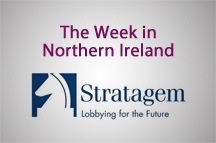 It certainly feels that way. From the big picture constitutional debate that has shaped our politics on this side of the Irish Sea through to the implications of Brexit for business and some challenging practical outworkings for the Northern Ireland Assembly, Brexit-free days are few and far between.
It certainly feels that way. From the big picture constitutional debate that has shaped our politics on this side of the Irish Sea through to the implications of Brexit for business and some challenging practical outworkings for the Northern Ireland Assembly, Brexit-free days are few and far between.
Twelve weeks on, where is Northern Ireland in the five stages of grief? Some are still in denial (we shall not exit). However, Daniel Greenberg, legal adviser in the Office of Speaker’s Counsel at the UK House of Commons, told a packed Assembly Senate Chamber that the Brexit legal challenges lodged by local politicians and activists are a non-starter.
He explored the prospect of “a sudden rush of unintended devolution” when the devolved administrations assume control over areas hitherto legislated for by Brussels.
Nevertheless, the UK Government could take back these policy areas if they wished through a new layer of reserved powers – or ‘transitional provisions’ - until devolved assemblies are deemed 'ready' to assume the reputed 80% of laws passed in Strasbourg and Brussels.
Others are clearly still angry - in a tone far from comforting for Theresa May, SDLP leader Colum Eastwood MLA last weekend told the British Irish Association Conference in Oxford that “Northern nationalists are once more a restless people.” In a speech that invoked the spirit of John Hume, the MLA for Foyle asserted that “the Brexit vote was a moment of true change because it is a moment of lasting change.”
While, like everyone else, Eastwood was vague on what form this change will ultimately take, he was sure of one thing – that the vote will colour and shape not only the life of the Assembly but each and every institution on these islands for decades to come.
Like Sinn Féin’s Martin McGuinness at the time of the result, Eastwood’s speech adhered to the well-tested adage that Britain’s difficulty is Ireland’s opportunity. He delivered a robust message for the Brexiteers in the UK Government. Referring to Leave's “take back control” slogan, he argued “Irish nationalism says this – we know how you feel. No one should therefore be surprised if in the wake of Brexit ‘Taking Back Control’ is precisely what we in the North now intend to do.”
The bargaining stage of grief comes next in the form of a joint letter from the First and deputy First Minister to the Prime Minister. In an Executive that has been dogged by division over Brexit, it was positive to see agreement that Northern Ireland is different from the rest of the UK, not least because of the land border with another EU member state, as well as recognition of specific arrangements such as the all-island Single Electricity Market, unique even in the EU.
Indeed, this was followed by the Westminster Northern Ireland Select Committee launching an inquiry into the future of the twisting, currently uncontrolled 365-mile land border between Northern Ireland and the Republic of Ireland following Brexit.
They have identified nine areas for review: what benefits currently derive from the existing open border; options for retaining the Common Travel Area (no ID required); options for the border if the UK were not part of the EU customs union; options for the border if the UK were not part of the Single Market; and options that would maintain the First and deputy First Ministers’ desire for free movement of people, goods and services.
The list continues, to include: policing and criminal justice arrangements required to avoid an increase in illegal activity; implications of Northern Ireland having some form of special status within a post-Brexit UK; implications for the UK and Ireland’s common visa system; and lessons from the other parts of the EU that have an external land border, such as between Norway and Sweden/Finland, or between Switzerland and its neighbours.
Depression came in the form of Michael O’Leary’s address to the annual CBI NI lunch. Having reduced services from the City of Derry Airport already, O’Leary reported that uncertainty about the future regulatory/open skies regime is a cause of real concern. He was clear: the referendum result has caused Ryanair to pivot their growth away from Northern Ireland and the UK.
So, three months on from the referendum, how do you separate the rhetoric from the reality? How does one assess if Michael O’Leary will really keep his word and not bring one of his new £100m planes to Belfast International Airport? How do you know what political messages will actually resonate with nationalists and unionists alike, and what will the future relationships across these Isles looks like?
Despite the expected media focus on the (holy) trinity of Davis, Fox and Johnson, those of us in Belfast, at the coal face/hard border of the UKexit debate, are following the work of Secretary of State James Brokenshire and his fresh team at the Northern Ireland Office as they navigate the complexity of relationships within and between the UK and its closest neighbour.
Like many times before, Northern Ireland’s influence, deliberately deployed or otherwise, can make an important contribution to international affairs. The same goes for our neighbours south of the border - what role will the Republic of Ireland’s government play in negotiations on the other side of the table, with the 27? Will they counter the inclination amongst some of the member states for a tough exit? Friend or foe, willing champion or reluctant ally? Let’s all accept it’s going to be challenging.












